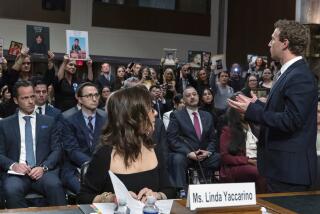Reno Warns TV Industry: Cut Violence
- Share via
WASHINGTON — Atty. Gen. Janet Reno called on the entertainment industry Wednesday to reduce television violence voluntarily but she warned that, if further steps are not taken soon, “government action will be imperative.”
Appearing before the Senate Commerce Committee, Reno stressed that her preference is for voluntary industry action and she commended television executives for adopting guidelines discouraging gratuitous violence and calling for parental advisory labels for some programs.
“I believe these are positive steps,” she said. “They are, however, extremely small steps--in fact, itty-bitty steps. . . . There are many more things the television industry can do.”
Reno’s testimony marked the first time that the Clinton Administration has added its voice to a growing chorus of congressional concern over the effect televised mayhem has on children. Rather than threatening specific steps, however, Reno said that the Administration--in the absence of stronger industry action--is prepared to support pending Senate legislation to deal with the problem.
“My instincts militate against government involvement in this area,” she said. “But I also believe that television violence and the development of our youth . . . go to the heart of our society’s values.”
Howard Stringer, president of CBS/Broadcast Group, and some other television executives who appeared later said that this fall’s lineup of shows contains more comedy and much less violence. They said that more industry moves are on the horizon, including anti-violence public service announcements and a television special on alternatives to violence that all the networks will broadcast.
Stringer said that the industry is responding to concerns over the level of violence in television. He cautioned that legislation in this area “is fraught not only with constitutional peril but also poses great danger . . . to high-quality TV.”
Judy Smith, a spokeswoman for NBC, said in an interview that “some bills in Congress, however well-intentioned, could erode the First Amendment and restrict the diversity of choice of TV programming.”
Sen. Ernest F. Hollings (D-S.C.), the committee chairman, has introduced a bill to restrict violent programming to late-night hours after most children have gone to bed. Another bill, sponsored by Sen. Byron L. Dorgan (D-N.D.), would require the Federal Communications Commission to issue periodic reports listing television programs that contain the most violence as well as their commercial sponsors.
Other bills would require both on-screen warning labels and advance notification in TV guides for shows that contain “violence or unsafe gun practices” and would seek to discourage advertising violent programs through commercial promotions broadcast during a family show.
Reno said that all these bills “appear to be constitutionally sound.” But she declared: “Despite the popular support for action to curb television violence, I believe that government intervention is neither the best option nor the first we should try.”
For example, besides voluntarily reducing on-screen violence, the industry should issue public reports and more detailed parental warnings about the content of violence in programs, she said.
Robert Peck, legislative counsel for the American Civil Liberties Union, said after the hearing that he strongly disagrees with Reno that bills pending in the Senate would pass constitutional muster.
“These bills do not define violence and they make no distinction between news, documentaries and dramatic programming,” Peck said. “You cannot regulate the content of TV programming according to the government or to some senator’s taste.”
While agreeing with Peck, some broadcast executives reached for comment also said that there is a debate within the industry over how strongly they should challenge Congress in the current climate of public concern over television violence. “I think Congress may push us with a bill, and we’re going to have to decide how we’re going to fight it,” one said.
Jack Valenti, president of the Motion Picture Assn. of America, who attended the hearing, told reporters that he had “no problem, no quarrel” with Reno’s testimony. Valenti, a frequent spokesman for the industry, said that “we’re taking action, we’re in the middle of action and we’re planning action.”
Several hundred top entertainment executives met for a two-day conference in Los Angeles in August to discuss violence in programming. They took under study a proposal by Sen. Paul Simon (D-Ill.), a leading critic of televised violence, to set up an advisory panel to monitor steps to reduce violent programs. Simon repeated his proposal to the Senate panel.
Reno, who has devoted attention to the welfare of children throughout her career, told senators parents have an equally important role to play in curbing TV violence.
“Parents can bring economic pressure to bear on companies who sponsor violent programming,” she said. “A national campaign would let advertisers and programmers know that Americans are willing to show their frustration with television violence with their wallets as well as their remote controls.”
Sen. John C. Danforth (R-Mo.), a committee member, said that, if Congress mandates disclosure of the violent content of television shows, “it might have some kind of preventative effect.”
Sen. John Kerry (D-Mass.) commended the industry for developing guidelines that discourage depictions of gratuitous violence. But he complained that often “there’s no application of these standards.”
Jackson reported from Washington and Hall from New York.
More to Read
Get the L.A. Times Politics newsletter
Deeply reported insights into legislation, politics and policy from Sacramento, Washington and beyond. In your inbox twice per week.
You may occasionally receive promotional content from the Los Angeles Times.










